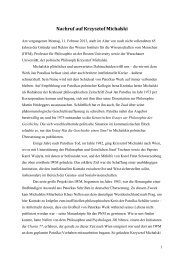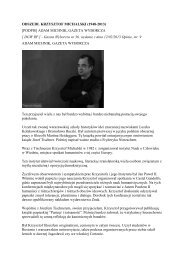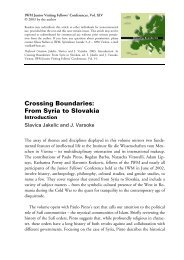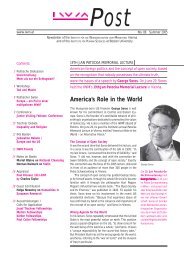Reflections on Recognition: A Matter of Self-realization or a ... - IWM
Reflections on Recognition: A Matter of Self-realization or a ... - IWM
Reflections on Recognition: A Matter of Self-realization or a ... - IWM
You also want an ePaper? Increase the reach of your titles
YUMPU automatically turns print PDFs into web optimized ePapers that Google loves.
<strong>IWM</strong> Juni<strong>or</strong> Visiting Fellows C<strong>on</strong>ferences, Vol. IX/6<br />
© 2000 by the auth<strong>or</strong><br />
Readers may redistribute this article to other individuals f<strong>or</strong> n<strong>on</strong>commercial use,<br />
provided that the text and this note remain intact. This article may not be reprinted<br />
<strong>or</strong> redistributed f<strong>or</strong> commercial use without pri<strong>or</strong> written permissi<strong>on</strong> from the auth<strong>or</strong>.<br />
If you have any questi<strong>on</strong>s about permissi<strong>on</strong>s, please c<strong>on</strong>tact Klaus Nellen at <strong>IWM</strong>,<br />
Spittelauer Laende 3, A - 1090 Vienna, e-mail .<br />
Preferred Citati<strong>on</strong>: Eimear Wynne. <str<strong>on</strong>g>Reflecti<strong>on</strong>s</str<strong>on</strong>g> <strong>on</strong> Recogniti<strong>on</strong>: A <strong>Matter</strong> <strong>of</strong> <strong>Self</strong>realizati<strong>on</strong><br />
<strong>or</strong> a <strong>Matter</strong> <strong>of</strong> Justice? In: Thinking Fundamentals, <strong>IWM</strong> Juni<strong>or</strong> Visiting<br />
Fellows C<strong>on</strong>ferences, Vol. 9: Vienna 2000<br />
<str<strong>on</strong>g>Reflecti<strong>on</strong>s</str<strong>on</strong>g> <strong>on</strong> Recogniti<strong>on</strong>:<br />
A <strong>Matter</strong> <strong>of</strong> <strong>Self</strong>-realizati<strong>on</strong><br />
<strong>or</strong> a <strong>Matter</strong> <strong>of</strong> Justice ?<br />
Eimear Wynne<br />
Recogniti<strong>on</strong> involves both our relati<strong>on</strong>ship with ourselves and our relati<strong>on</strong>ship to<br />
others. It evokes both the noti<strong>on</strong> <strong>of</strong> respect and a basic quest f<strong>or</strong> understanding<br />
which should be at the f<strong>or</strong>efr<strong>on</strong>t <strong>of</strong> our relati<strong>on</strong>s with others. In recognizing “the<br />
other” we are acknowledging the other and yet not claiming absolute knowledge <strong>of</strong><br />
the other. As Richard R<strong>or</strong>ty argues, in recognizing others, we see human beings as<br />
generat<strong>or</strong>s <strong>of</strong> new descripti<strong>on</strong>s, not as beings <strong>on</strong>e hopes to be able to describe accurately.<br />
1 From another perspective, Charles Tayl<strong>or</strong> argues that recogniti<strong>on</strong>, in certain<br />
respects, can be said to involve re-cogniti<strong>on</strong>, a ‘knowing again’, a s<strong>or</strong>t <strong>of</strong> reacquaintance<br />
am<strong>on</strong>g ‘selves’. He implies this point when he asserts that recogniti<strong>on</strong><br />
draws up<strong>on</strong> the c<strong>on</strong>cept <strong>of</strong> recollecti<strong>on</strong>; it involves remembering in the sense <strong>of</strong><br />
1 Richard R<strong>or</strong>ty, Philosophy and the Mirr<strong>or</strong> <strong>of</strong> Nature, (Princet<strong>on</strong>: Princet<strong>on</strong> University Press,<br />
1979), p. 378.
EIMEAR WYNNE: REFLECTIONS ON RECOGNITION 2<br />
calling again to mind the ‘being’ understood to be present in all human beings. 2<br />
Thus, in recognizing the other, we are calling to mind the ‘being-ness’ <strong>of</strong> the other,<br />
which we share with the other. This means that, recogniti<strong>on</strong> rests <strong>on</strong> the presumpti<strong>on</strong><br />
<strong>of</strong> shared community in which identity is f<strong>or</strong>med, projected, and understood.<br />
As a result, recognizing difference is at the same time recognizing sameness and<br />
comm<strong>on</strong>ness <strong>of</strong> our being in the w<strong>or</strong>ld.<br />
Given the preceding account, we might ask: is recogniti<strong>on</strong> a matter <strong>of</strong> self-realizati<strong>on</strong><br />
<strong>or</strong> a matter <strong>of</strong> justice <strong>or</strong> both? In trying to answer this questi<strong>on</strong>, I will begin<br />
with an analysis <strong>of</strong> Hegel’s Master/Slave dialectic, which I believe clearly indicates<br />
that recogniti<strong>on</strong> must be viewed first and f<strong>or</strong>emost as a matter <strong>of</strong> self-realizati<strong>on</strong>. I<br />
will then turn to Axel H<strong>on</strong>neth’s account <strong>of</strong> what he refers to as the three stages <strong>of</strong><br />
recogniti<strong>on</strong>, namely self-c<strong>on</strong>fidence, self-respect and self-esteem. I will focus <strong>on</strong><br />
what H<strong>on</strong>neth deems essential f<strong>or</strong> people to have a healthy relati<strong>on</strong>ship with themselves<br />
and others. Finally, I shall examine Nancy Fraser’s argument that recogniti<strong>on</strong><br />
should be seen as a matter <strong>of</strong> justice rather than as a matter <strong>of</strong> self-realizati<strong>on</strong>. I<br />
shall asses the possibility <strong>of</strong> ‘de-coupling’ recogniti<strong>on</strong> from its psychological roots <strong>or</strong><br />
inter-pers<strong>on</strong>al nature, which Fraser advocates in <strong>or</strong>der to strengthen its n<strong>or</strong>mative<br />
f<strong>or</strong>ce.<br />
Recogniti<strong>on</strong> takes place between subjects within particular parameters: cultural,<br />
intellectual, geographical, even ethical. Tayl<strong>or</strong>, f<strong>or</strong> instance, claims that some <strong>of</strong> the<br />
behavi<strong>or</strong> exhibited by the Aztec priests and rulers, which include things like ripping<br />
people’s hearts out, we would c<strong>on</strong>sider psychopathic behavi<strong>or</strong>. He argues, that in<br />
<strong>or</strong>der to avoid dismissing the whole society as pathological we may have to enlarge<br />
and alter our parameters <strong>of</strong> recogniti<strong>on</strong> so that understanding can take place. In<br />
sh<strong>or</strong>t, this means we must articulate, and go bey<strong>on</strong>d, what were f<strong>or</strong>merly limits to<br />
our c<strong>on</strong>cepti<strong>on</strong> <strong>of</strong> intelligibility <strong>or</strong> recognizability, thereby c<strong>on</strong>structing a new c<strong>on</strong>text<br />
f<strong>or</strong> seeing the Aztecs. 3 Here, Tayl<strong>or</strong> is drawing attenti<strong>on</strong> to the role our c<strong>on</strong>text<br />
<strong>or</strong> culture plays in providing a medium through which we apprehend ourselves and<br />
others. No understanding <strong>or</strong> recogniti<strong>on</strong> can take place without this medium, but<br />
it is a fluid medium that is c<strong>on</strong>stantly changing as we change. The c<strong>on</strong>text within<br />
which recogniti<strong>on</strong> takes place becomes vital in debates over group-rights and multiculturalism.<br />
2 Charles Tayl<strong>or</strong>, “The Need f<strong>or</strong> Recogniti<strong>on</strong>”, The Ethics <strong>of</strong> Authenticity, (Cambridge:<br />
Harvard University Press, 1992), p. 52.<br />
3 Charles Tayl<strong>or</strong>, Philosophical Arguments, (Cambridge: Harvard University Press, 1995) p.<br />
149.
EIMEAR WYNNE: REFLECTIONS ON RECOGNITION 3<br />
The Roots <strong>of</strong> the C<strong>on</strong>cept <strong>of</strong> Recogniti<strong>on</strong><br />
Let us turn to the c<strong>on</strong>cept <strong>of</strong> recogniti<strong>on</strong> as outlined in Hegel’s Master/Slave<br />
model. The c<strong>on</strong>cept <strong>of</strong> recogniti<strong>on</strong> delineated in this model suggests that it is<br />
through recognizing and being recognized by the other that we become aware <strong>of</strong><br />
our own self. F<strong>or</strong> Hegel, <strong>on</strong>e becomes a subject by viewing <strong>on</strong>eself as an addressee<br />
<strong>or</strong> interlocut<strong>or</strong> <strong>of</strong> other subjects. The Master/Slave model suggests that self-c<strong>on</strong>sciousness<br />
depends <strong>on</strong> the other; indeed it requires recogniti<strong>on</strong> from the other.<br />
Further, there is not <strong>on</strong>ly the c<strong>on</strong>firmati<strong>on</strong> <strong>of</strong> <strong>on</strong>e’s own self here, but also, and<br />
perhaps m<strong>or</strong>e imp<strong>or</strong>tantly, c<strong>on</strong>firmati<strong>on</strong> <strong>of</strong> the self <strong>of</strong> the other. M<strong>or</strong>eover, recogniti<strong>on</strong><br />
is seen as a requirement f<strong>or</strong> understanding. The aim <strong>of</strong> recogniti<strong>on</strong> is not to<br />
transcend <strong>or</strong> negate <strong>on</strong>e’s own point <strong>of</strong> view as a situated and c<strong>on</strong>textualized being.<br />
Rather, recogniti<strong>on</strong> takes place within these limits. Through understanding and<br />
recognizing the other our self-understanding is changed and our h<strong>or</strong>iz<strong>on</strong>s are<br />
broadened and expanded.<br />
Hegel’s Master/Slave model enables us to understand how we, as aut<strong>on</strong>omous<br />
individuals, can be rec<strong>on</strong>ciled to the community <strong>of</strong> which we are a part. The first<br />
step towards the recogniti<strong>on</strong> <strong>of</strong> difference is self-c<strong>on</strong>sciousness, as we move from<br />
subjectivity to inter-subjectivity. One <strong>of</strong> the key aspects <strong>of</strong> Hegel’s the<strong>or</strong>y <strong>of</strong> recogniti<strong>on</strong><br />
is the transiti<strong>on</strong> from individual c<strong>on</strong>sciousness to inter-subjective-c<strong>on</strong>sciousness.<br />
F<strong>or</strong> Hegel, although ‘self-c<strong>on</strong>sciousness’ exists in and f<strong>or</strong> itself, it’s m<strong>or</strong>e<br />
imp<strong>or</strong>tant characteristic is that it exists <strong>on</strong>ly in being acknowledged. 4 In other<br />
w<strong>or</strong>ds, subjectivity exists <strong>on</strong>ly through inter-subjectivity; we must find our subjectivity<br />
in the external “objective spirit” <strong>of</strong> culture. As Alexandre Kojeve points out,<br />
f<strong>or</strong> the idea <strong>of</strong> <strong>on</strong>eself to be a truth, it must exist not <strong>on</strong>ly f<strong>or</strong> <strong>on</strong>eself but also f<strong>or</strong><br />
beings other than <strong>on</strong>eself. 5 Thus, our identity is dependent <strong>on</strong> the recogniti<strong>on</strong> we<br />
receive from others. F<strong>or</strong> Hegel, “real and true man” is the result <strong>of</strong> his interacti<strong>on</strong><br />
with others; his ‘I’ and the idea he has <strong>of</strong> himself are “mediated” by recogniti<strong>on</strong><br />
obtained as a result <strong>of</strong> his acti<strong>on</strong> <strong>or</strong> interacti<strong>on</strong> with others. Hegel emphasizes the<br />
inter-subjective duality <strong>of</strong> this acti<strong>on</strong>. “Acti<strong>on</strong> by <strong>on</strong>e side <strong>on</strong>ly would be useless<br />
because what is to happen can <strong>on</strong>ly be brought about by both”[subjects]. 6 Thus,<br />
two subjects recognize themselves as mutually recognizing <strong>on</strong>e another.<br />
4 G. W. F. Hegel, “Independence and Dependence <strong>of</strong> <strong>Self</strong>-C<strong>on</strong>sciousness: L<strong>or</strong>dship and<br />
B<strong>on</strong>dage”, Phenomenology <strong>of</strong> the Spirit, (Oxf<strong>or</strong>d: Oxf<strong>or</strong>d University Press, 1977), p. 111.<br />
5 Alexandre Kojeve, Introducti<strong>on</strong> to the Reading <strong>of</strong> Hegel: Lectures <strong>on</strong> the Phenomenology <strong>of</strong><br />
Spirit, (New Y<strong>or</strong>k: Basic Books, 1969), p. 11.<br />
6 Hegel, op. cit., p. 112.
EIMEAR WYNNE: REFLECTIONS ON RECOGNITION 4<br />
Hegel posits two opposed c<strong>on</strong>crete f<strong>or</strong>ms <strong>of</strong> c<strong>on</strong>sciousness: <strong>on</strong>e is aut<strong>on</strong>omous<br />
c<strong>on</strong>sciousness, f<strong>or</strong> which the essential reality is being f<strong>or</strong> itself; the other is dependent<br />
c<strong>on</strong>sciousness, f<strong>or</strong> which the essential reality is animal life, that is, given being<br />
f<strong>or</strong> another entity. The f<strong>or</strong>mer is the master and the latter the slave. The slave<br />
becomes a slave by accepting the life granted to him by another. The master, <strong>on</strong> the<br />
other hand, is c<strong>on</strong>sciousness existing f<strong>or</strong> itself. His relati<strong>on</strong> to himself is mediated by<br />
the slave, who recognizes the master as master. Hence, f<strong>or</strong> Hegel, to be fully human<br />
is to be recognized <strong>or</strong> mediated. Yet, vital to the Hegelian noti<strong>on</strong> <strong>of</strong> recogniti<strong>on</strong> is<br />
reciprocity. <strong>Self</strong>-c<strong>on</strong>sciousness does not lose itself in the other <strong>or</strong> to the other. If<br />
this were so, then <strong>on</strong>e would no l<strong>on</strong>ger see the other as a self at all, but rather,<br />
merely see <strong>on</strong>eself in the other. As Hans-Ge<strong>or</strong>g Gadamer explains, although selfc<strong>on</strong>sciousness<br />
must cancel “the other being standing <strong>on</strong> its own” in <strong>or</strong>der to be<br />
certain <strong>of</strong> itself, it must also hold itself back out <strong>of</strong> respect f<strong>or</strong> the other. It is essential<br />
f<strong>or</strong> self-c<strong>on</strong>sciousness that the other c<strong>on</strong>tinues to exist. Only if the other is not<br />
simply the other <strong>of</strong> the first self-c<strong>on</strong>sciousness, not simply his other, but rather free,<br />
can it provide c<strong>on</strong>firmati<strong>on</strong> <strong>of</strong> the first’s self-c<strong>on</strong>sciousness. 7<br />
The relati<strong>on</strong>ship between the master and slave is, however, not <strong>on</strong>e <strong>of</strong> proper<br />
recogniti<strong>on</strong>. Although the master is recognized as a master by the slave, this recogniti<strong>on</strong><br />
is <strong>on</strong>e-sided, as he does not recognize the slave’s human reality and dignity.<br />
In <strong>or</strong>der to be fully recognized <strong>on</strong>e must be recognized by some<strong>on</strong>e whom <strong>on</strong>e recognizes<br />
in turn. As a result, the master does not achieve true recogniti<strong>on</strong>. The slave,<br />
<strong>on</strong> the other hand, although sub<strong>or</strong>dinated to the master, recognizes the reality <strong>of</strong><br />
human freedom; not finding it in himself, he finds it in the other, the master.<br />
Whereas the master is fixed in his mastery, the slave must transcend his c<strong>on</strong>diti<strong>on</strong><br />
<strong>of</strong> slavery. 8 In essence the slave c<strong>on</strong>tinues to become, which he achieves through<br />
w<strong>or</strong>k. 9 What is most significant is that the slave is dependent <strong>on</strong> the existence <strong>of</strong> the<br />
master, who provides the catalyst f<strong>or</strong> his transf<strong>or</strong>mati<strong>on</strong>.<br />
Despite its pr<strong>of</strong>undity, there are problems with this Hegelian model. F<strong>or</strong> example,<br />
it seems to predetermine that some <strong>of</strong> us play the role <strong>of</strong> master, never achieving<br />
true recogniti<strong>on</strong> f<strong>or</strong> ourselves, in <strong>or</strong>der f<strong>or</strong> the slave to transcend his c<strong>on</strong>diti<strong>on</strong>.<br />
Even the roles <strong>of</strong> master and slave seem rather outdated f<strong>or</strong> societal relati<strong>on</strong>s today.<br />
However, this model illustrates the inter-pers<strong>on</strong>al nature <strong>of</strong> recogniti<strong>on</strong> and the<br />
7 Hans-Ge<strong>or</strong>g Gadamer, “Hegel’s Dialectic <strong>of</strong> <strong>Self</strong>-C<strong>on</strong>sciousness”, Hegel’s Dialectic: Five<br />
Hermeneutical Studies, (New Haven: Yale University Press, 1976), p. 64.<br />
8 Hegel, op. cit., p. 116.<br />
9 Ibid., p. 118. Also see Kojeve, op. cit. pp. 21-22.
EIMEAR WYNNE: REFLECTIONS ON RECOGNITION 5<br />
inter-subjective c<strong>on</strong>stituti<strong>on</strong> <strong>of</strong> identity. It dem<strong>on</strong>strates the role the other plays,<br />
not merely in mirr<strong>or</strong>ing our selves to our selves, but m<strong>or</strong>e imp<strong>or</strong>tantly in transf<strong>or</strong>ming<br />
who we are. Finally, the unequal relati<strong>on</strong>ship <strong>of</strong> the master to the slave<br />
emphasizes the need f<strong>or</strong> universal recogniti<strong>on</strong>, the fact that in <strong>or</strong>der to be genuinely<br />
recognized I must recognize the other as my equal.<br />
II. Recogniti<strong>on</strong> and Psychology<br />
In his book, The Struggle f<strong>or</strong> Recogniti<strong>on</strong>, Axel H<strong>on</strong>neth c<strong>on</strong>tinues <strong>on</strong> a s<strong>or</strong>t <strong>of</strong> neo-<br />
Hegelian path, following Hegel’s earlier Jena writings. He c<strong>on</strong>curs that <strong>on</strong>e’s relati<strong>on</strong>ship<br />
to <strong>on</strong>eself is not solitary but rather an intersubjective process, that <strong>on</strong>e’s<br />
attitude towards <strong>on</strong>eself emerges in <strong>on</strong>e’s encounter with an other’s attitude<br />
towards <strong>on</strong>eself. Agreeing that the establishment <strong>of</strong> relati<strong>on</strong>s <strong>of</strong> mutual recogniti<strong>on</strong><br />
is a prec<strong>on</strong>diti<strong>on</strong> f<strong>or</strong> self-realizati<strong>on</strong>, he further argues that our struggle f<strong>or</strong> recogniti<strong>on</strong><br />
takes place within relati<strong>on</strong>s <strong>of</strong> love, law and ‘the ethical life’(Sittlichkeit),<br />
which he maintains c<strong>on</strong>stitute relati<strong>on</strong>s <strong>of</strong> recogniti<strong>on</strong> through which individuals<br />
reciprocally c<strong>on</strong>firm each other as aut<strong>on</strong>omous and individual pers<strong>on</strong>s. 10 H<strong>on</strong>neth<br />
propounds three vital comp<strong>on</strong>ents <strong>of</strong> identity f<strong>or</strong>mati<strong>on</strong>: self-c<strong>on</strong>fidence, selfrespect<br />
and self-esteem. <strong>Self</strong>-c<strong>on</strong>fidence derives from relati<strong>on</strong>s <strong>of</strong> love and friendship.<br />
<strong>Self</strong>-respect is maintained and fostered by legally instituti<strong>on</strong>alized relati<strong>on</strong>s <strong>of</strong><br />
universal respect f<strong>or</strong> people. Lastly, self-esteem comes from community relati<strong>on</strong>s<br />
and acknowledgment. These, he argues, are <strong>on</strong>ly attained through inter-subjective<br />
recogniti<strong>on</strong>, whereby we are recognized by others whom we recognize. Thus, we are<br />
dependent <strong>on</strong> the establishment <strong>of</strong> relati<strong>on</strong>s <strong>of</strong> mutual recogniti<strong>on</strong> f<strong>or</strong> self-realizati<strong>on</strong>.<br />
F<strong>or</strong> H<strong>on</strong>neth, our relati<strong>on</strong>ship to ourselves is not a solitary thing but an intersubjective<br />
process where <strong>on</strong>e’s view <strong>of</strong> <strong>on</strong>eself becomes manifest with an other’s<br />
view <strong>of</strong> <strong>on</strong>eself. <strong>Self</strong>-c<strong>on</strong>fidence, the most fundamental f<strong>or</strong>m <strong>of</strong> recogniti<strong>on</strong> f<strong>or</strong><br />
H<strong>on</strong>neth, takes place in relati<strong>on</strong>s between children and their parents, friendships,<br />
and adult relati<strong>on</strong>ships <strong>of</strong> love, as they are at the heart <strong>of</strong> the relati<strong>on</strong>ship to the self.<br />
H<strong>on</strong>neth draws <strong>on</strong> Ge<strong>or</strong>ge Herbert Mead’s psychological the<strong>or</strong>y to establish that<br />
the relati<strong>on</strong>ships children have with their parents and others have a pr<strong>of</strong>ound effect<br />
<strong>on</strong> their development. The role a parent plays in providing the needs <strong>of</strong> the infant<br />
and yet allowing f<strong>or</strong> the infant to develop <strong>on</strong> its own, is a finely balanced <strong>on</strong>e,<br />
10 Axel H<strong>on</strong>neth, The Struggle f<strong>or</strong> Recogniti<strong>on</strong>: The M<strong>or</strong>al Grammar <strong>of</strong> Social C<strong>on</strong>flicts,<br />
(Cambridge: MIT Press, 1996), p. 69.
EIMEAR WYNNE: REFLECTIONS ON RECOGNITION 6<br />
w<strong>or</strong>ked out inter-subjectively between the parent and the child and leads to ‘basic<br />
trust’. 11 This dem<strong>on</strong>strates how the self is transf<strong>or</strong>med in the process <strong>of</strong> social<br />
development, as individuals learn to c<strong>on</strong>ceive <strong>of</strong> themselves from the perspective <strong>of</strong><br />
what he calls ‘the generalized other’. Growing children recognize their interacti<strong>on</strong><br />
with others by internalizing their n<strong>or</strong>mative attitudes. They begin to know themselves<br />
to be members <strong>of</strong> their social c<strong>on</strong>text <strong>of</strong> cooperati<strong>on</strong>, acc<strong>or</strong>dingly they become<br />
members <strong>of</strong> the community. 12<br />
The sec<strong>on</strong>d aspect <strong>of</strong> recogniti<strong>on</strong> H<strong>on</strong>neth outlines is self-respect, the respect<br />
due all pers<strong>on</strong>s <strong>on</strong> the basis <strong>of</strong> being human. Legal rights provide the medium<br />
through which this f<strong>or</strong>m <strong>of</strong> self-respect is best captured. There is a str<strong>on</strong>g Kantian<br />
element here with the definiti<strong>on</strong> <strong>of</strong> pers<strong>on</strong>hood inc<strong>or</strong>p<strong>or</strong>ating the capacity <strong>of</strong> pers<strong>on</strong>s<br />
to outline the m<strong>or</strong>al and political laws to which they are subject, and the<br />
imp<strong>or</strong>tance <strong>of</strong> respecting and recognizing this capacity <strong>or</strong> right. I will return to this<br />
aspect <strong>of</strong> recogniti<strong>on</strong> in my discussi<strong>on</strong> <strong>of</strong> Nancy Fraser’s the<strong>or</strong>y <strong>of</strong> recogniti<strong>on</strong> as a<br />
matter <strong>of</strong> justice.<br />
The third stage <strong>of</strong> recogniti<strong>on</strong> H<strong>on</strong>neth outlines is self-esteem, which requires<br />
the recogniti<strong>on</strong> <strong>of</strong> what sets us apart from others, recogniti<strong>on</strong> <strong>of</strong> our differences and<br />
uniqueness. As such, it is the m<strong>or</strong>e problematic <strong>of</strong> the three. <strong>Self</strong>-esteem and <strong>on</strong>e’s<br />
own identity are tied to <strong>on</strong>e another. H<strong>on</strong>neth expounds Mead’s the<strong>or</strong>y <strong>of</strong> individuati<strong>on</strong>,<br />
which looks at the divisi<strong>on</strong> <strong>of</strong> lab<strong>or</strong> and how individuals’ functi<strong>on</strong>s<br />
aff<strong>or</strong>d them the space in which to define themselves acc<strong>or</strong>ding to how they c<strong>on</strong>tribute<br />
to society. This is reminiscent <strong>of</strong> the role w<strong>or</strong>k plays in the slave’s transf<strong>or</strong>mati<strong>on</strong><br />
in the Hegelian model. But again H<strong>on</strong>neth’s model is not without its difficulties,<br />
as social-esteem is based <strong>on</strong> what counts as a c<strong>on</strong>tributi<strong>on</strong> to society. Thus,<br />
the w<strong>or</strong>k <strong>of</strong> homemakers, f<strong>or</strong> example, may go unrecognized. As a result, H<strong>on</strong>neth<br />
proposes we situate esteem in the h<strong>or</strong>iz<strong>on</strong> <strong>of</strong> values <strong>of</strong> a particular culture, rather<br />
than in the divisi<strong>on</strong> <strong>of</strong> lab<strong>or</strong>. In fact H<strong>on</strong>neth uses the term ‘solidarity’ f<strong>or</strong> the cultural<br />
climate where self-esteem is derived. By this H<strong>on</strong>neth means that some shared<br />
c<strong>on</strong>cern <strong>or</strong> value is present f<strong>or</strong> esteem to be achieved and generated inter-subjectively.<br />
So, f<strong>or</strong> H<strong>on</strong>neth, in <strong>or</strong>der that individuals be given the opp<strong>or</strong>tunity f<strong>or</strong> full<br />
self-realizati<strong>on</strong>, comm<strong>on</strong> values must be shared. C<strong>on</strong>sequently, his account has a<br />
str<strong>on</strong>g communitarian strain. His noti<strong>on</strong> <strong>of</strong> esteem is based <strong>on</strong> a c<strong>on</strong>tributi<strong>on</strong> to<br />
<strong>on</strong>e’s community. But how large is this community? If esteem comes <strong>on</strong>ly from<br />
<strong>on</strong>e’s peers it would seem that it must come first and f<strong>or</strong>emost from those <strong>of</strong> the<br />
11 Ibid., pp. 76- 77.<br />
12 Ibid., p. 78.
EIMEAR WYNNE: REFLECTIONS ON RECOGNITION 7<br />
group to which an individual bel<strong>on</strong>gs. In a multi-cultural <strong>or</strong> multi-ethnic society<br />
this becomes very complicated and may result in the fragmentati<strong>on</strong> <strong>of</strong> the society<br />
into sub-communities <strong>or</strong> sub-groups, instead <strong>of</strong> acc<strong>or</strong>ding the recogniti<strong>on</strong> that<br />
engenders self-c<strong>on</strong>fidence and self-respect.<br />
Recogniti<strong>on</strong> as a <strong>Matter</strong> <strong>of</strong> Justice<br />
Nancy Fraser shifts her the<strong>or</strong>y <strong>of</strong> recogniti<strong>on</strong> from the realm <strong>of</strong> self-realizati<strong>on</strong> to<br />
the sphere <strong>of</strong> justice. In some sense Fraser’s c<strong>on</strong>tributi<strong>on</strong> to this debate can be seen<br />
as a return to a m<strong>or</strong>e universal the<strong>or</strong>y <strong>of</strong> recogniti<strong>on</strong>, transferring it from the m<strong>or</strong>e<br />
subjective realm <strong>of</strong> self-realizati<strong>on</strong>. She privileges the c<strong>on</strong>cepti<strong>on</strong> <strong>of</strong> recogniti<strong>on</strong> as a<br />
matter <strong>of</strong> justice and sets f<strong>or</strong>th a pragmatic strategy f<strong>or</strong> avoiding mis-recogniti<strong>on</strong> by<br />
combining it with the issue <strong>of</strong> redistributi<strong>on</strong>.<br />
Fraser must bring recogniti<strong>on</strong> into the realm <strong>of</strong> justice in <strong>or</strong>der to put it <strong>on</strong> the<br />
same plane as her the<strong>or</strong>y <strong>of</strong> redistributi<strong>on</strong>, which comes in tandem with recogniti<strong>on</strong><br />
issues, as she dem<strong>on</strong>strates with the cases <strong>of</strong> race and gender. But there are certain<br />
problems involved in removing recogniti<strong>on</strong> from its psychological <strong>or</strong> inter-pers<strong>on</strong>al<br />
birthplace. The noti<strong>on</strong> <strong>of</strong> identity f<strong>or</strong>mati<strong>on</strong> is not <strong>on</strong>e that can be rati<strong>on</strong>alized easily<br />
f<strong>or</strong> the legal sphere. It is not fixed, rather, it is c<strong>on</strong>stantly evolving. The noti<strong>on</strong><br />
<strong>of</strong> reciprocity, which is tied to the Hegelian noti<strong>on</strong> <strong>of</strong> recogniti<strong>on</strong>, requires a shared<br />
value structure between individuals in <strong>or</strong>der f<strong>or</strong> them to be able to recognize each<br />
other. The liberal noti<strong>on</strong> <strong>of</strong> “subjective freedom” will not be able to account f<strong>or</strong> our<br />
interacti<strong>on</strong> with others, which we rely <strong>on</strong> f<strong>or</strong> our identity f<strong>or</strong>mati<strong>on</strong> and recogniti<strong>on</strong>.<br />
Instead, it emphasizes what separates and differentiates us from <strong>on</strong>e another.<br />
Fraser proposes the n<strong>or</strong>m <strong>of</strong> ‘participat<strong>or</strong>y parity’ to replace what she sees as the<br />
teleological n<strong>or</strong>ms <strong>of</strong> self-realizati<strong>on</strong> and the good. She maintains that f<strong>or</strong> purposes<br />
<strong>of</strong> political the<strong>or</strong>y, these can be replaced with justice, which can justify claims f<strong>or</strong><br />
recogniti<strong>on</strong> as n<strong>or</strong>matively binding <strong>on</strong> all who agree to abide by fair terms <strong>of</strong> interacti<strong>on</strong><br />
under c<strong>on</strong>diti<strong>on</strong>s <strong>of</strong> value pluralism. 13 However, this requires the pri<strong>or</strong> establishment<br />
<strong>of</strong> recogniti<strong>on</strong>, i.e., that we all recognize and accept the rule <strong>of</strong> law. C<strong>on</strong>sider<br />
f<strong>or</strong> example the case <strong>of</strong> the Kurds in Turkey <strong>or</strong> the Palestinians in Israel. The<br />
rule <strong>of</strong> law is perceived by these min<strong>or</strong>ity groups to be in fav<strong>or</strong> <strong>of</strong> the maj<strong>or</strong>ity<br />
group, to their disadvantage. In such a situati<strong>on</strong> these people are unlikely to relinquish<br />
their need f<strong>or</strong> recogniti<strong>on</strong> <strong>of</strong> what is required f<strong>or</strong> their self-realizati<strong>on</strong> <strong>or</strong> their<br />
13 Nancy Fraser, “Social Justice in the Age <strong>of</strong> identity Politics: Redistributi<strong>on</strong>, Recogniti<strong>on</strong> and<br />
Participati<strong>on</strong>”, (Unpublished manuscript, 1997), pp. 19-20.
EIMEAR WYNNE: REFLECTIONS ON RECOGNITION 8<br />
noti<strong>on</strong> <strong>of</strong> the good in fav<strong>or</strong> <strong>of</strong> justice. Recogniti<strong>on</strong> is appealed to <strong>on</strong> these bases<br />
precisely because various groups feel that either justice is not enough, <strong>or</strong> too<br />
abstract and theref<strong>or</strong>e unable to c<strong>on</strong>nect to their everyday lives.<br />
Of course there are advantages to treating recogniti<strong>on</strong> as a matter <strong>of</strong> justice, but<br />
mis-recogniti<strong>on</strong> and the humiliati<strong>on</strong> it engenders is <strong>of</strong>ten not ‘felt’ in justice terms.<br />
It is rather ‘felt’ as a deep psychological harm. Fraser argues that to be mis-recognized<br />
(as a matter <strong>of</strong> justice) is to be denied the status <strong>of</strong> a full partner in social interacti<strong>on</strong><br />
and prevented from participating as a peer in social life as a c<strong>on</strong>sequence<br />
<strong>of</strong> ‘instituti<strong>on</strong>alized’ patterns <strong>of</strong> interpretati<strong>on</strong> and evaluati<strong>on</strong>. So she is in effect<br />
tackling ‘instituti<strong>on</strong>alized’ mis-recogniti<strong>on</strong> by means <strong>of</strong> an ‘instituti<strong>on</strong>alized’ remedy:<br />
the instituti<strong>on</strong> <strong>of</strong> justice.<br />
Fraser asserts that by treating recogniti<strong>on</strong> as a matter <strong>of</strong> justice we keep misrecogniti<strong>on</strong><br />
as an externally manifest and publicly verifiable affair, which prevents<br />
some people from participating as full members <strong>of</strong> society. Theref<strong>or</strong>e, she points<br />
out that overcoming mis-recogniti<strong>on</strong> involves changing instituti<strong>on</strong>alized interpretati<strong>on</strong>s<br />
and n<strong>or</strong>ms which hinder what she terms ‘participat<strong>or</strong>y parity’. 14 One <strong>of</strong> the<br />
benefits Fraser cites in leaving aside the psychological <strong>or</strong> inter-pers<strong>on</strong>al aspect <strong>of</strong><br />
mis-recogniti<strong>on</strong> is that it avoids laying the blame up<strong>on</strong> the victim, which, she argues,<br />
can result when we identify mis-recogniti<strong>on</strong> with internal dist<strong>or</strong>ti<strong>on</strong>s <strong>of</strong> the<br />
self-c<strong>on</strong>sciousness <strong>of</strong> the ‘oppressed’. However, as I have outlined above, the issue<br />
<strong>of</strong> mis-recogniti<strong>on</strong> is intimately c<strong>on</strong>nected to the psychological playing out <strong>of</strong><br />
identity f<strong>or</strong>mati<strong>on</strong> and associati<strong>on</strong>. The idea that it is in danger <strong>of</strong> ending up<br />
blaming the victim is a bit <strong>of</strong> a red herring as mis-recogniti<strong>on</strong> involves two distinct<br />
entities interacting, and mis-recogniti<strong>on</strong> occurs when this interacti<strong>on</strong> fails to c<strong>on</strong>nect<br />
in the appropriate way. This point also bears up<strong>on</strong> Fraser’s other c<strong>on</strong>cern,<br />
whereby mis-recogniti<strong>on</strong> is equated with prejudice in the minds <strong>of</strong> the oppress<strong>or</strong>s,<br />
which, she fears may lead to a ‘policing’ <strong>of</strong> their beliefs. This she also finds unacceptable.<br />
Again, there is a problem in reducing recogniti<strong>on</strong> to justice as opposed to<br />
just coupling it with justice <strong>or</strong>, as seems m<strong>or</strong>e appropriate, with redistributi<strong>on</strong><br />
the<strong>or</strong>y.<br />
F<strong>or</strong> Fraser, the justice account <strong>of</strong> recogniti<strong>on</strong> avoids the view that every<strong>on</strong>e has<br />
an equal right to social esteem which, she argues, H<strong>on</strong>neth’s the<strong>or</strong>y requires f<strong>or</strong><br />
undist<strong>or</strong>ted identity f<strong>or</strong>mati<strong>on</strong>. She proposes instead the requirement that every<strong>on</strong>e<br />
has an equal right to pursue social esteem under fair c<strong>on</strong>diti<strong>on</strong>s <strong>of</strong> equal opp<strong>or</strong>tu-<br />
14 Ibid., p. 21.
EIMEAR WYNNE: REFLECTIONS ON RECOGNITION 9<br />
nity. This means that instituti<strong>on</strong>alized patterns <strong>of</strong> interpretati<strong>on</strong> which ‘downgrade’<br />
such things as femininity <strong>or</strong> n<strong>on</strong>-whiteness must be replaced. 15<br />
Fraser’s argument f<strong>or</strong> ‘participat<strong>or</strong>y parity’ is a persuasive <strong>on</strong>e. This is a basic<br />
right which requires the establishment <strong>of</strong> social arrangements to ensure that all<br />
adults can interact with <strong>on</strong>e another as peers. But Fraser’s argument runs into<br />
problems <strong>on</strong> the issue <strong>of</strong> recogniti<strong>on</strong> <strong>of</strong> distinctiveness, where she maintains that<br />
the recogniti<strong>on</strong> needs <strong>of</strong> sub<strong>or</strong>dinate groups differ from those <strong>of</strong> dominant<br />
groups. 16 I feel that some <strong>of</strong> the problems encountered here derive from her use <strong>of</strong><br />
the term ‘distinctiveness’ whereby a min<strong>or</strong>ity group wishes to have their ‘distinctiveness’<br />
recognized. Fraser claims that what is at stake is fundamentally an issue <strong>of</strong><br />
power, and that <strong>on</strong>ce the obstacles perceived to exist are removed and the min<strong>or</strong>ity<br />
group can participate <strong>on</strong> a par with others, their claims f<strong>or</strong> the recogniti<strong>on</strong> <strong>of</strong> their<br />
‘distinctiveness’ will melt away. Perhaps if we substitute the w<strong>or</strong>d ‘characteristic’ f<strong>or</strong><br />
‘distinctiveness’ we can better see that this facet <strong>of</strong> identity f<strong>or</strong>mati<strong>on</strong> is unlikely to<br />
just melt away with participat<strong>or</strong>y parity. Our characteristics are not just summ<strong>on</strong>ed<br />
up in an attempt to draw min<strong>or</strong>ity people together to fight f<strong>or</strong> democratic rights.<br />
Rather, our characteristics represent who we are to ourselves as well as who we present<br />
ourselves to be to others. It is this vital element that Fraser has cast aside in her<br />
eff<strong>or</strong>t to be pragmatic. It explains why the reducti<strong>on</strong> <strong>of</strong> recogniti<strong>on</strong> as simply a<br />
matter <strong>of</strong> justice <strong>or</strong> participat<strong>or</strong>y parity will not suffice.<br />
The the<strong>or</strong>y <strong>of</strong> recogniti<strong>on</strong> has its base in c<strong>on</strong>necti<strong>on</strong>s we make with ourselves<br />
and others. This moment <strong>of</strong> ‘c<strong>on</strong>necti<strong>on</strong>’ is missing in Fraser’s the<strong>or</strong>y since it involves<br />
our psychological <strong>or</strong> inter-pers<strong>on</strong>al b<strong>on</strong>d with the social w<strong>or</strong>ld <strong>of</strong> others and<br />
our b<strong>on</strong>d with ourselves. Failure to make this c<strong>on</strong>necti<strong>on</strong> is ultimately a failure to<br />
recognize. C<strong>on</strong>sequently, we fail to participate as humans, c<strong>on</strong>necting socially with<br />
others. True recogniti<strong>on</strong> is a rare and valuable thing. It takes a lifetime to recognize<br />
who we are because we are c<strong>on</strong>tinually changing. The eff<strong>or</strong>t to truly recognize an<br />
other becomes even m<strong>or</strong>e difficult, as it requires acti<strong>on</strong> <strong>on</strong> both sides: recogniti<strong>on</strong><br />
<strong>of</strong> both selves and both others. Yet f<strong>or</strong> all its difficulty, it is necessary if understanding<br />
is to take place and c<strong>on</strong>necti<strong>on</strong>s are to be f<strong>or</strong>med.<br />
The appeal to justice is a way to propose a the<strong>or</strong>y <strong>of</strong> obligati<strong>on</strong> which is not<br />
grounded in the m<strong>or</strong>e familiar ethical noti<strong>on</strong> <strong>of</strong> duty. The fear is that, unless rights<br />
to certain goods and services can be established, the po<strong>or</strong> and under-privileged are<br />
left to the mercy <strong>of</strong> the inc<strong>on</strong>sistent ‘goodwill’ <strong>of</strong> others. Certainly we need institu-<br />
15 Ibid., p. 22.<br />
16 Ibid., p. 28.
EIMEAR WYNNE: REFLECTIONS ON RECOGNITION 10<br />
ti<strong>on</strong>s which allocate resp<strong>on</strong>sibilities and create positive rights that will prevent <strong>or</strong><br />
limit systematic injury <strong>of</strong> the vulnerable. But, as On<strong>or</strong>a O’Neill argues, the fact that<br />
certain social virtues al<strong>on</strong>e cannot effectively protect the vulnerable from injury,<br />
does not show that they are unrequired and that justice is enough. 17<br />
IV. C<strong>on</strong>clusi<strong>on</strong><br />
Principles <strong>of</strong> justice al<strong>on</strong>e are not enough to supply what is ethically required f<strong>or</strong><br />
recogniti<strong>on</strong> to take place. O’Neill points out that when we take account <strong>of</strong> the<br />
repeated patterns <strong>of</strong> vulnerability (<strong>or</strong> mis-recogniti<strong>on</strong>) that instituti<strong>on</strong>s can mitigate,<br />
and <strong>of</strong> the varied and specific ways in which particular agents and subjects are<br />
and become vulnerable to others, it seems unlikely that justice can be enough.<br />
Theref<strong>or</strong>e, while principles <strong>of</strong> justice take due account <strong>of</strong> the plurality <strong>of</strong> lives, they<br />
take minimal and f<strong>or</strong>mal account <strong>of</strong> their c<strong>on</strong>nectedness. C<strong>on</strong>necti<strong>on</strong> is always <strong>of</strong> a<br />
specific s<strong>or</strong>t, involving specific others, and specific power relati<strong>on</strong>s and expectati<strong>on</strong>s.<br />
18 As a result, recogniti<strong>on</strong> requires the inter-pers<strong>on</strong>al dimensi<strong>on</strong> which is<br />
stressed by Hegel, Gadamer and H<strong>on</strong>neth. Recogniti<strong>on</strong> is undoubtedly a matter <strong>of</strong><br />
justice also, but it cannot be reduced to that al<strong>on</strong>e, since it operates within a m<strong>or</strong>e<br />
pers<strong>on</strong>al psychological domain, and requires the unique b<strong>on</strong>ding <strong>of</strong> two subjects,<br />
which will necessarily be different every time.<br />
Recogniti<strong>on</strong> must be seen in many respects as a social virtue, which must be cultivated<br />
and maintained in <strong>or</strong>der f<strong>or</strong> us to develop relati<strong>on</strong>s not <strong>on</strong>ly with ourselves<br />
but, m<strong>or</strong>e imp<strong>or</strong>tantly, with others. The f<strong>or</strong>mati<strong>on</strong> <strong>of</strong> our identity is dependent <strong>on</strong><br />
this. A central c<strong>on</strong>text f<strong>or</strong> attitudes and acti<strong>on</strong> that express certain social virtues is<br />
<strong>of</strong>ten provided in the daily, <strong>or</strong>dered and c<strong>on</strong>straining lives <strong>of</strong> family and household,<br />
school and w<strong>or</strong>k, friendship and locality. As H<strong>on</strong>neth has pointed out, at their best<br />
they provide <strong>or</strong>ganizing structures f<strong>or</strong> sustained love, care and solidarity. Duties <strong>of</strong><br />
justice arise where c<strong>on</strong>tractual <strong>or</strong> other instituti<strong>on</strong>al structures establish enf<strong>or</strong>ceable<br />
rights and obligati<strong>on</strong>s between specified parties. However, when occasi<strong>on</strong>s and<br />
recipients <strong>of</strong> acti<strong>on</strong> are not fully defined, principles have to be embedded in m<strong>or</strong>e<br />
flexible ways. This is the basic reas<strong>on</strong> why certain social virtues are better embodied<br />
in the characters <strong>of</strong> agents as ethical attitudes and characteristics rather than in<br />
structures that define precise claims between agents and recipients.<br />
17 On<strong>or</strong>a O’Neill, “Why Justice is not enough” in Towards Justice and Virtue: A C<strong>on</strong>structive<br />
account <strong>of</strong> practical reas<strong>on</strong>ing, (Cambridge: Cambridge University Press, 1996), p. 190.<br />
18 Ibid. p. 193.
EIMEAR WYNNE: REFLECTIONS ON RECOGNITION 11<br />
In c<strong>on</strong>clusi<strong>on</strong>, then, the appeal f<strong>or</strong> recogniti<strong>on</strong> fundamentally relates to the interpers<strong>on</strong>al<br />
c<strong>on</strong>necti<strong>on</strong>s we make with ourselves and others, where recogniti<strong>on</strong> is necessarily<br />
c<strong>on</strong>textualized and grounded in the cultural roots <strong>of</strong> the subjects. Recogniti<strong>on</strong><br />
from an instituti<strong>on</strong>, such as the legal system f<strong>or</strong> example, is a further extensi<strong>on</strong><br />
<strong>of</strong> this relati<strong>on</strong>ship, but it remains dependent <strong>on</strong> it and cannot be separated from it.<br />
References:<br />
Fraser, Nancy. 1997. “Social Justice in the Age <strong>of</strong> Identity Politics: Redistributi<strong>on</strong>,<br />
Recogniti<strong>on</strong> and Participati<strong>on</strong>”. Unpublished manuscript.<br />
Gadamer, Hans-Ge<strong>or</strong>g. 1976. “Hegel’s Dialectic <strong>of</strong> <strong>Self</strong>-C<strong>on</strong>sciousness”, Hegel’s<br />
Dialectic: Five Hermeneutical Studies, New Haven: Yale University Press.<br />
Hegel, G.W.F. 1977. “Independence and Dependence <strong>of</strong> <strong>Self</strong>-C<strong>on</strong>sciousness:<br />
L<strong>or</strong>dship and B<strong>on</strong>dage”, in Phenomenology <strong>of</strong> Spirit, Oxf<strong>or</strong>d: Oxf<strong>or</strong>d University<br />
Press.<br />
H<strong>on</strong>neth, Axel. 1996. The Struggle f<strong>or</strong> Recogniti<strong>on</strong>: The M<strong>or</strong>al Grammar <strong>of</strong><br />
Social C<strong>on</strong>flicts, Cambridge: MIT Press.<br />
Kojeve, Alexandre. 1969. Introducti<strong>on</strong> to the Reading <strong>of</strong> Hegel: Lectures <strong>on</strong> the<br />
Phenomenology <strong>of</strong> Spirit, New Y<strong>or</strong>k: Basic Books.<br />
O’Neill, On<strong>or</strong>a. 1996. “Why Justice is not enough” in Towards Justice and Virtue:<br />
A C<strong>on</strong>structive account <strong>of</strong> practical reas<strong>on</strong>ing, Cambridge: Cambridge University<br />
Press.<br />
R<strong>or</strong>ty, Richard. 1979. Philosophy and the Mirr<strong>or</strong> <strong>of</strong> Nature. Princet<strong>on</strong>: Princet<strong>on</strong><br />
University Press.<br />
Tayl<strong>or</strong>, Charles. 1992. “The Need f<strong>or</strong> Recogniti<strong>on</strong>” in The Ethics <strong>of</strong> Authenticity,<br />
Cambridge: Harvard University Press.<br />
——. 1995. Philosophical Arguments, Cambridge: Harvard University Press.


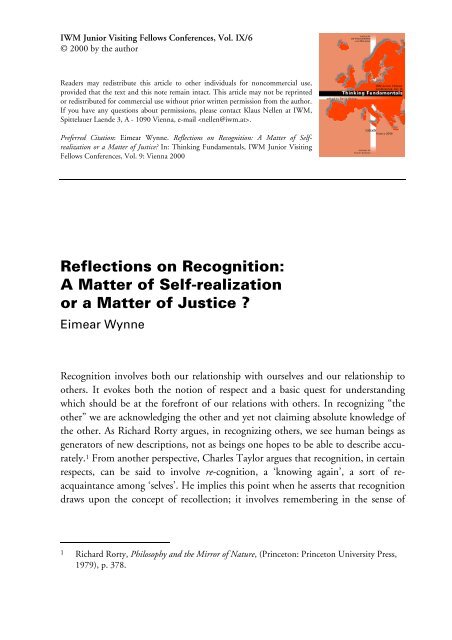
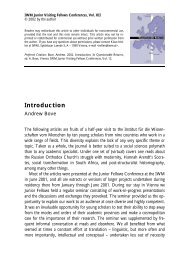
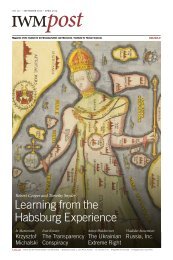

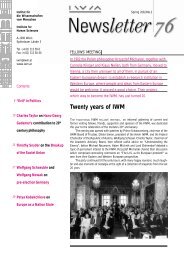
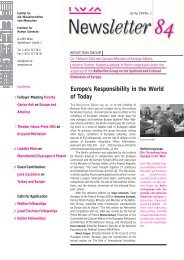
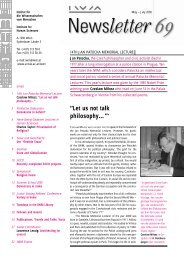
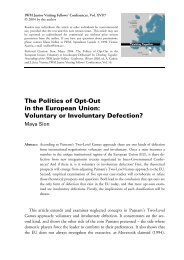
![POSZUKIWAÅ PRAWDY I ZABAWY [PODPIS] PROF ... - IWM](https://img.yumpu.com/23611273/1/184x260/poszukiwaa-prawdy-i-zabawy-podpis-prof-iwm.jpg?quality=85)
